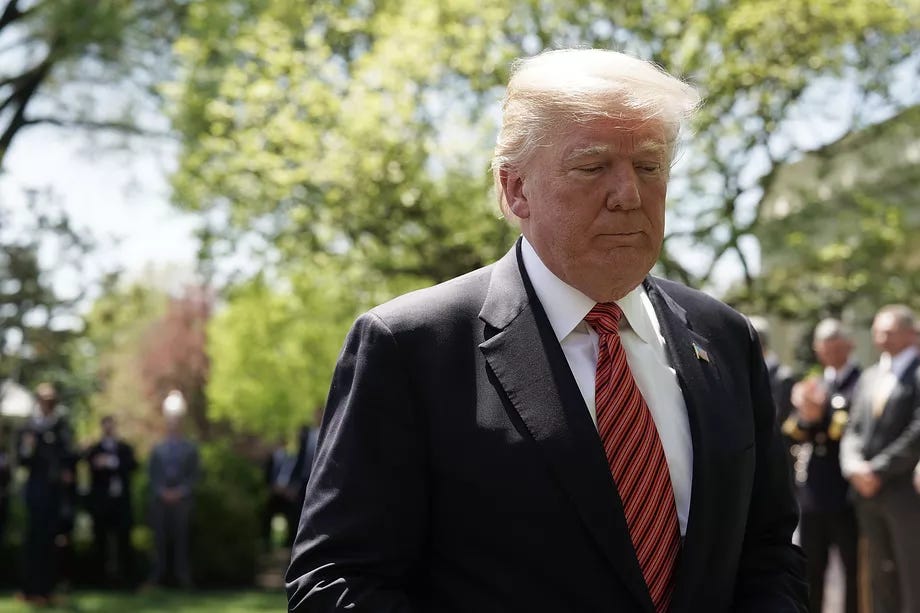Hush Money, Forgery, Lies, Collusion. Do You Believe Trump?
In the end, this sad saga will come down to credibility and trust.

Two revelations, actually.
One from Rudy Giuliani, the former mayor of New York City who now represents President Donald Trump. On Fox News last night, he said Trump repaid Michael Cohen the $130,000 his lawyer gave porn actress Story Daniels in exchange for her silence before the election. As of Wednesday, the official line had been that Trump knew nothing about the money, that Cohen paid out of his own pocket and, importantly, that there was nothing to suggest Trump had paid off Daniels. The president confirmed Giuliani’s statements this morning in a series of tweets.

Mr. Cohen, an attorney, received a monthly retainer, not from the campaign and having nothing to do with the campaign, from which he entered into, through reimbursement, a private contract between two parties, known as a non-disclosure agreement, or NDA. These agreements are.....
May 3, 2018As of Wednesday, this was all the information we had on Trump’s well-being. Today, we don’t have even that. As Sam Stein said: “This should be a major scandal. A presidential candidate deprived voters of immensely critical information: that of his own health. We didn’t and don’t know what medical condition the president is in.”
A note about journalism and the crisis Trump has created for those who cover politics. I think it’s safe to say that no one currently working the politics beat in Washington has ever encountered an elected figure, much less a president, who has been so indifferent to truth, even truth incredibly easy to verify, like the fact that Trump really did support the Iraq War, no matter how strenuously he urged to the contrary. Indeed, Trump this week surpassed the 3,000 mark. The Washington Post documented that many lies plus one that Trump told since taking office a year and a half ago.
Now, in a normal ordinary context, a journalist would just ignore someone who had proven him or herself to be untrustworthy. But the president of the United States does not function in a normal ordinary context. Journalists can’t treat him the way they treat disreputable sources. I point this out not to offer a solution (I don’t have one), but to underscore a troubling ethical and professional conundrum. As a reporter, what do you do when the president’s word is worth increasingly less than the paper it’s written on? This is a new era demanding new methods of reporting.
I think it’s worth stressing that Bornstein’s revelation should be worrisome to voters informed by Trump’s fraudulence. This is not to say they voted as a direct result of “extraordinary stamina.” But they were deprived, as Stein said, of extraordinary information needed for giving someone extraordinary power. We know already that the president is overweight, that he lives on McDonald’s, and that he appears often confused. What if there’s something seriously concerning in his medical records? We’ll never know. Trump’s goons broke into Bornstein’s office and stole them.
What we are seeing is a man who made a case to the American people based on an accumulation of falsehoods, distortions, equivocations, misrepresentations and outright lies (see the Post fact-checkers for a complete catalog). Trump isn’t the first president to dissemble, nor will he be the last. (And evading the truth isn’t always a bad thing.) But no president has been so haunted by the specter of mendacity.
This is important as a matter of democratic principle. Authority and power are derived by the consent of the governed (you and me), and that consent depends on the people’s ability to trust their leaders. But it’s also important as a practical matter.
Remember, this president is being investigated for possible collusion with the Russian government, and this president insists we trust him when he’s says, in all caps, that there was no-way no-how definitely absolutely positively NO COLLUSION!
Trump is a good communicator. He sends simple messages and repeats them, a lot. To anyone not paying close attention (and in my opinion, that’s a majority of people), simple repetitions of “NO COLLUSION” have the force of fact even in the face of evidence to the contrary. In other words, even if Special Counsel Robert Mueller can prove collusion or another crimes, a lot of people are not going to believe it.
This is where, I think, Giuliani’s and Bornstein’s revelations play a unique role. They, too, are simple. Nothing complicated about hush money and forged documents. And thanks to a competitive media, these revelations will be repeated today and tomorrow and every time Trump is caught in a lie. A federal investigation is mind-numbingly complex. In the end, this sad American saga will come down to credibility and trust.
Do the American people trust career professionals impartially pursuing justice (Mueller and his team)? Or do they believe a president who told 3,001 lies in 17 months, who paid off a porn star, and who deceived voters about his health?
Politics is complex.
But sometimes, it’s simple.
A note to readers
Hey, I’m working here! Help me grow my audience by emailing this newsletter to your friends and family. Share it on Facebook and Twitter, too! Just click the icons below.
I’d especially recommend sending it to people you don’t like. Serves ’em right.
Seriously. This is a labor of love. I need help. Thanks.
—JS
Got something to say? Follow me on Twitter @johnastoehr.


